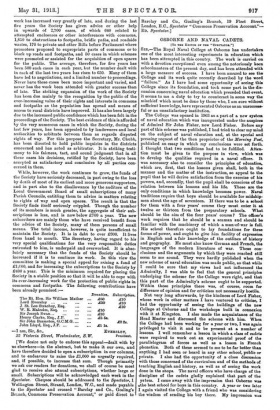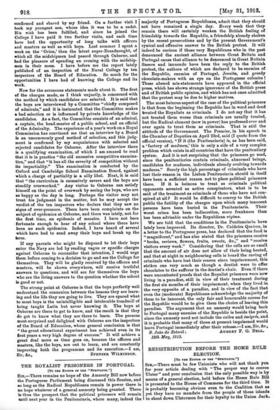OSBORNE AND NAVAL CADETS.
[To SHY EDITOR OP THE "SPECTATOR.")
Sin,—The Royal Naval College at Osborne has undertaken one of the most interesting experiments in education which has been attempted in this country. The work is carried on with a devotion exceptional even among the notoriously keen schoolmasters of the present day, and has been attended with a large measure of success. I have been amazed to see the College and its work quite recently described by the word " failure." As I have had some opportunity of seeing this College since its foundation, and took some part in the dis- cussion concerning naval education which preceded that event, it seems to me a duty to try to counteract in some way the mischief which must be done by those who, I am sure without sufficient knowledge, have represented Osborne as an unsuccess- ful or an unsatisfactory institution.
The College was opened in 1903 as a part of a new system of naval education which was inaugurated under the auspices of Admiral Sir John Fisher, now Lord Fisher. Before any part of this scheme was published, I had tried to clear my mind on the subject of naval education and, at the special and pressing request of the then proprietor of the Morning Post, published an essay in which my conclusions were set forth. I thought that two conditions had to be fulfilled. Atten- tion must be given to the purpose in view, which was to develop the qualities required in a naval officer. It was necessary also to consider the principles of education, which are, first, that the lessons given shall, both in the manner and the matter of the instruction, so appeal to the pupil that he will derive satisfaction from the exercise of his powers, and, secondly, that the pupil shall be conscious of the relation between his lessons and his life. These are the only conditions in which knowledge becomes power. Naval traditions require that boys should be available for midship- men about the age of seventeen. If there was to be a school for them with a four years' course they must enter it at twelve or thirteen from the preparatory schools. What should be the aim of the four years course P The officer's work requires that be should be a seaman and should be familiar with the machinery of which a man-of-war is fulL His school therefcre ought to lay foundations for these forms of power, and ought to give him facility of expression in English and a fair knowledge of the outlines of history and geography. He must also know German and French, the languages of the modern literature of war. These con- clusions and the arguments by which they were reached still seem to me sound. They were hardly published when the new scheme of naval education was made public, so that while I could be sure that my views had not influenced the Admiralty, I was able to feel that the general principles underlying the scheme for the College were right, and that this part of the Admiralty's scheme ought to be supported. Within those principles there was, of course, room for difference of opinion and for criticism not necessarily hostile.
Not very long afterwards, by the kindness of Lord Fisher, whose work in other matters I have ventured to criticise, I had the opportunity of seeing the buildings of the new College at Osborne and the workshops built in connexion with it at Kingston. I also made the acquaintance of the Head Master and discussed the scheme with him. When the College had been working for a year or two, I was again privileged to visit it and to be present at a number of lessons. I well remember a lesson in which a class of cadets were required to work out an experimental proof of the parallelogram of forces as well as a lesson in French phonetics. Both of these seemed to use to be far better than anything I had seen or heard in any other school, public or private. I also had the opportunity of a close discussion with those concerned of the curriculum and of the methods of teaching English and history, as well as of seeing the work done in the shops. The naval officers who have charge of the discipline of the cadets gladly explained that part of the ystem. I came away with the impression that Osborne was sthe best school for boys in this country. A year or two later I again visited the College with a friend who was considering the wisdom of sending his boy there. My impression was confirmed and shared by my friend. On a further visit I took my youngest son, whose idea it was to be a cadet. His wish has been fulfilled, and since he joined the College I have paid it two further visits, and each time have had the opportunity of long talks with officers and masters as well as with boys. Last summer I spent a week on the ' Orion,' then the latest super-Dreadnought, of which all the midshipmen had passed through Osborne, and had the pleasure of spending an evening with the midship- men in their mess. I have before me the report lately published of an inspection of the Naval College by ten inspectors of the Board of Education. So much for the opportunities I have had of knowing the College and its work.
Now for the erroneous statements made about it. The first of the charges made, as I think unjustly, is concerned with the method by which candidates are selected. It is said that the boys are interviewed by a Committee "chiefly composed of admirals," and it is insinuated that the Committee makes a bad selection or is influenced by private knowledge of the candidates. As a fact, the Committee consists of an admiral, a captain, the head-master of a public school, and an official of the Admiralty. The experience of a year's work on a Royal Commission has convinced me that an interview by a Board is an uncommonly good method of selection, and this judg- ment is confirmed by my acquaintance with selected and rejected candidates for Osborne. After the interview there is a qualifying examination, of which I am amazed to read that it is in practice "the old excessive competitive examina- tion," and that "it has all the severity of competition without its impartiality." The examination is conducted by the Oxford and Cambridge School Examination Board, against which a charge of partiality is a silly libeL Next, it is said that " the curriculum is excessively severe and the boys are steadily overworked." Any visitor to Osborne can satisfy himself on the point of overwork by seeing the boys, who are as happy as the day is long. Perhaps the visitor may not trust his judgment in the matter, but he may accept the verdict of the ten inspectors who declare that they saw no signs of over-pressure. There have been complaints on the subject of epidemics at Osborne, and there was lately, not for the first time, an epidemic of measles. I have not been fortunate enough to hear of any school where there have been no such epidemics. Indeed, I have heard of several which have had to send away their boys and break up the term.
If any parents who might be disposed to let their boys enter the Navy are led by reading vague or specific charges against Osborne to reconsider that intention, I would urge them before coming to a decision to go and see the College for themselves. They will be gladly received by the officers and masters, will be shown everywhere, will receive truthful answers to questions, and will see for themselves the boys who are the living answers to the question whether the school is good or not.
The strong point at Osborne is that the boys perfectly well understand the connexion between the lessons they are learn- ing and the life they are going to live. They are spared what to most boys is the unintelligible and intolerable treadmill of being taught Latin but never knowing it. The boys at Osborne are there to get to know, and the result is that they do get to know what they are there to learn. The persons most surprised and delighted with Osborne are the inspectors of the Board of Education, whose general conclusion is that "the great educational experiment has achieved even in its first years a very high degree of success." It will achieve a great deal more as time goes on, because the officers and masters, like the boys, are out to learn, and are constantly improving both the programme and its execution.—I am,



















































 Previous page
Previous page